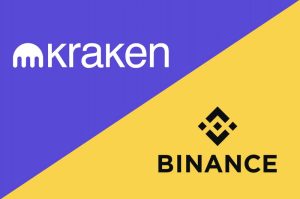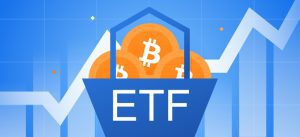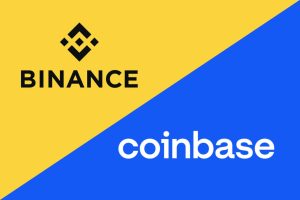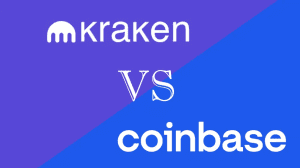Kraken vs. Coinbase: Which Crypto Exchange Is Best for You?

Cryptocurrency exchanges are essential tools in the digital economy, serving as platforms where users can buy, sell, and trade various cryptocurrencies. Among the plethora of services available, Kraken vs. Coinbase has emerged as a prominent question, as both are established players. But which one is right for you?
This comprehensive comparison evaluates key aspects of both crypto exchanges to help users make informed decisions. Therefore, we examined their features, security, available currencies, fees, and ease of use to determine the best option: Kraken or Coinbase.
Kraken vs. Coinbase – A Quick Look
Here’s a summarized head-to-head comparison of Kraken vs. Coinbase.
Kraken
- Trading options: Margin (up to 5x), futures (up to 50x), staking (outside US).
- Additional services: Cryptowatch trading terminal, diverse altcoins.
- Crypto support: 200+ cryptocurrencies.
- Global availability: 176 countries.
- App availability: Limited access in 5 countries. Unavailable in NY or WA.
- Security: 95% of assets in cold storage, PGP encryption, 2FA.
- Fees: Tiered structure with reduced fees for high volume.
Pros
- Low fees
- High liquidity
- Global Availability
- Top security features
Cons
- No staking inside USA
- Complexity for beginners
Coinbase
- Trading options: Spot, limited margin (up to 3x, now disabled).
- Additional services: Hot wallet for easy transfers, user-friendly interface.
- Crypto support: 250+ cryptocurrencies.
- Global availability: 100+ countries.
- App availability: Fully accessible in most regions, except Hawaii.
- Security: 98% of assets in cold storage, PGP encryption, security keys, 2FA.
- Fees: Varying fees based on transaction size and payment method.
Pros
- User friendly
- Secure storage
- High crypto support
- Easy funding options
Cons
- Higher transaction fees
- Unavailable in all countries
The Methodology Behind Kraken vs. Coinbase
We considered several crucial factors to conduct a fair and unbiased comparison. These include user experience, security protocols, available cryptocurrencies, transaction fees, and the overall user-friendliness of the apps and browser services. Furthermore, we meticulously analyzed each aspect to provide a detailed overview of Kraken vs. Coinbase.
As a result, readers can easily decide which platform aligns best with their needs.
Features
Cryptocurrency exchanges Kraken and Coinbase cater to a diverse range of investors worldwide.
Kraken stands out for its advanced trading features for both beginners and experienced traders. It offers various trading pairs, margin trading, futures trading, and staking services. Moreover, Kraken’s intuitive interface and robust charting tools empower users to make well-informed trading decisions.
Note:
On February 9, 2023, Kraken reached a settlement with the US Securities and Exchange Commission (SEC), agreeing to pay $30 million in penalties and discontinuing its staking services for US clients. Consequently, Kraken will cease offering staking services to its US-based customers. However, customers outside the United States will still have the option to stake their cryptocurrency assets through a distinct subsidiary of Kraken.
Coinbase, on the other hand, emphasizes simplicity and user-friendliness. It is renowned for its user-friendly interface and smooth navigation, making it an ideal choice for beginners. The platform also offers a secure digital wallet and a user-friendly mobile app, which allows users to manage portfolios on the go.
- Global availability: Coinbase operates in over 100 countries, ensuring accessibility for a wide user base. Kraken extends its services to 176 countries, offering a broader reach. However, both platforms have regional limitations. Coinbase is unavailable to residents of Hawaii, while users cannot access Kraken in New York or Washington.
- Customer support: Both exchanges provide 24/7 global customer support via live chat. However, response times may vary during peak trading hours due to high traffic. Additionally, both platforms offer comprehensive help center guides and question-and-answer centers.
- Margin trading: Kraken stands out with its margin trading feature, offering leverage up to five times, aligning with industry standards. In contrast, Coinbase introduced margin trading at three times leverage in early 2020 but temporarily disabled the feature by November of the same year.
- Mobile apps: Kraken and Coinbase offer highly-rated mobile applications that mirror the functionality on their respective web platforms. However, Kraken’s mobile app is inaccessible in five countries and one territory, potentially limiting user accessibility.
Additional Features
Kraken introduced Cryptowatch, a powerful trading terminal analyzing over 2,000 cryptocurrency markets. This free service empowers traders to monitor price movements and market trends across multiple platforms. Users can set price alerts, enhancing their trading strategies.
For more timely notifications, traders can upgrade this service by paying one credit per alert, providing valuable insights for informed decision-making.
Meanwhile, Coinbase provides a distinctive feature—a hot wallet. It allows users to deposit, store, and withdraw currency seamlessly. Notably, one doesn’t need to be a Coinbase user to utilize this wallet, making it convenient for traders who frequently transfer between various fiat currencies and cryptocurrencies.
In contrast, Kraken offers clients a digital wallet to store coins between purchases but does not provide a personal wallet service like Coinbase.
Security
When choosing a cryptocurrency exchange, security is paramount. Both Kraken and Coinbase have exemplary security track records, with no significant breaches in their histories. They employ robust measures to safeguard user funds and data.
Kraken takes extensive precautions to ensure the security of user assets. It stores a significant portion, 95% to be precise, in guarded air-gapped cold storage, rendering it inaccessible to online threats. The platform maintains stringent surveillance, employing multiple checkpoints throughout the signup process.
Therefore, it adds an extra level of security, instilling confidence in users regarding the safety of their investments.
Meanwhile, Coinbase employs a similarly stringent security strategy. Impressively, it keeps 98% of user deposits in offline, geographically distributed cold storage. Hence, the method ensures that most funds are isolated from online risks.
Additionally, Coinbase offers an added advantage to US traders: the Federal Deposit Insurance Corporation (FDIC). It insures up to $250,000 of an individual’s USD cash balances, enhancing the security net for users.
User-Side Security Features
Both crypto exchanges offer additional protection for users.
- Two-Factor Authentication (2FA): Kraken and Coinbase employ 2FA for crucial actions such as withdrawals and transfers. Coinbase’s system defaults to 2FA for SMS verification during login. Therefore, even if login credentials are compromised, an additional proof layer is required for access.
- Security keys: Both Kraken and Coinbase offer the option of physical security keys. When users insert them into a computer drive, these devices authenticate user logins and generate one-time passcodes. Thus, investors can create multiple keys and store them in secure locations, adding extra physical security to their accounts.
- Pretty Good Privacy (PGP): Both platforms guide users through setting up PGP encryption for online communications with the exchange. This encryption method ensures that all cryptocurrency correspondences, including sensitive information, remain private and secure.
- Authenticator apps: Instead of relying on text messages or email forms of 2FA, users can use popular apps like Google Authenticator. This method enhances security by generating time-sensitive codes required for verification.
Kraken vs. Coinbase Cryptocurrency Support
Kraken supports over 200 cryptocurrencies, including popular ones like Bitcoin (BTC), Ethereum (ETH), and Ripple (XRP), as well as numerous altcoins. This extensive selection provides users with ample opportunities for diversification.
Coinbase, on the other hand, offers a wider selection of 250+ cryptocurrencies than Kraken. For instance, it supports major cryptocurrencies like BTC, ETH, and Litecoin (LTC), as well as a broader range of altcoins.
Moreover, both platforms support several fiat currencies, including the US dollar (USD), Euro (EUR), British Pound (GBP), Swiss franc (CHF), Canadian dollar (CAD), Australian dollar (AUD), and Japanese Yen (JPY).
Fees
Kraken implements a tiered fee structure, wherein trading fees decrease as users trade higher volumes. This model incentivizes active traders with reduced prices, which makes it economical for those engaging in frequent transactions.
| 30-Day Trading Volume | Maker Fee | Trader Fee |
| $0 to $50,000 | 0.16% | 0.26% |
| $50,001 to $100,000 | 0.14% | 0.24% |
| $100,001 to $250,000 | 0.12% | 0.22% |
| $250,001 to $500,000 | 0.10% | 0.20% |
| $500,001 to $1,000,000 | 0.08% | 0.18% |
| $1,000,001 to $2,500,000 | 0.06% | 0.16% |
| $2,500,001 to $5,000,000 | 0.04% | 0.14% |
| $5,000,001 to $10,000,000 | 0.02% | 0.12% |
| More than $10,000,000 | 0.00% | 0.01% |
Meanwhile, Coinbase charges fees based on the transaction amount and payment method. While fees may be higher for smaller transactions, they decrease for larger purchases. Coinbase also offers a subscription service called Coinbase Pro, which provides lower costs for professional traders.
| Pricing Tier | Maker Fee | Trader Fee |
| $0 to $10K | 0.60% | 0.40% |
| $10,000 to $50,000 | 0.40% | 0.25% |
| $50,000 to $100,000 | 0.25% | 0.15% |
| $100,000 to $1,000,000 | 0.20% | 0.10% |
| $1,000,000 to $15,000,000 | 0.18% | 0.08% |
| $15,000,000 to $75,000,000 | 0.16% | 0.06% |
| $75,000,000 to $250,000,000 | 0.12% | 0.03% |
| $250,000,000 to $400,000,000 | 0.08% | 0.00% |
| $400,000,000 and up | 0.05% | 0.00% |
Ease-of-Use
Kraken’s platform, although feature-rich, may initially appear overwhelming to beginners due to its complexity. However, the exchange provides educational resources and guides to assist users in navigating the platform effectively. Once users become accustomed to its interface, Kraken offers a seamless trading experience.
Meanwhile, Coinbase is widely recognized for its user-friendly interface, making it incredibly accessible to beginners. The platform’s simplicity and its mobile app’s convenience allow users to buy, sell, and manage their cryptocurrencies effortlessly.
Final Verdict
Choosing between Kraken and Coinbase ultimately depends on individual preferences and trading requirements.
Kraken appeals to experienced traders seeking advanced features and a diverse range of cryptocurrencies, while Coinbase caters to beginners and users who prioritize simplicity and a user-friendly interface. Both exchanges excel in security measures, offering users a safe environment to trade and invest in cryptocurrencies.
However, please keep in mind the platform’s availability and the accessible services in your location.
FAQs about Kraken vs. Coinbase
Kraken or Coinbase? Here’s more information if you’re still undecided.
Which exchange is better for beginners: Kraken or Coinbase?
Coinbase better suits beginners due to its user-friendly interface and straightforward navigation. Hence, it’s easier for novice users to buy, sell, and manage cryptocurrencies.
Does Kraken offer more cryptocurrencies than Coinbase?
Both Kraken and Coinbase support a wide variety of cryptocurrencies. However, Coinbase offers more options than Kraken.
Are my funds safe on both Kraken and Coinbase?
Kraken and Coinbase prioritize user security. Therefore, they employ robust measures like 2FA, cold storage, and more to ensure the safety of users’ funds and data.
Which exchange has lower fees for trading?
Kraken offers a tiered fee structure, providing less costs for high-volume traders. Meanwhile, Coinbase’s prices vary based on the transaction amount and payment method. Furthermore, Coinbase Pro, a subscription service, offers lower fees for professional traders.
Can I still access my staking services on Kraken if I am a non-US customer?
Non-US customers can continue to access staking services on Kraken through a separate subsidiary. The discontinuation of staking services in the US does not impact Kraken’s international clientele, allowing them to retain their staking options and manage their crypto assets effectively.
Kraken vs. Coinbase – Final Words
In conclusion, both Kraken and Coinbase have their unique strengths, catering to different user preferences. Choosing the right exchange depends on individual needs, whether they’re advanced trading features, a wide variety of cryptocurrencies, or user-friendly simplicity.
By considering the factors outlined in this comparison, users can make an educated decision and embark on their cryptocurrency trading journey with confidence.
Please note that cryptocurrency investments carry inherent risks. Therefore, it’s essential to conduct thorough research and seek professional advice before engaging in any financial transactions.





